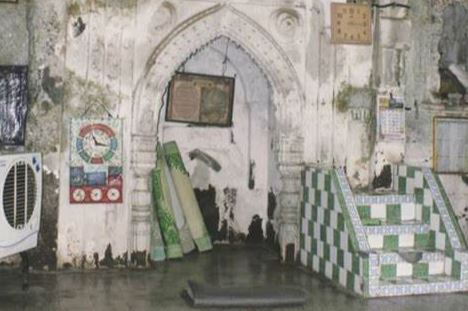
NEW DELHI – An ancient mosque, dating back 800 years, in the state of Maharashtra, controlled by the BJP, has been closed for the Muslim worshippers.
The closure followed a complaint filed by a Hindu group associated with the RSS, according to The Wire on Saturday.
The mosque, located in Jalgaon, has become inaccessible to the Muslim community after the district collector issued an interim restraining order while reviewing the complaint filed by the right-wing organization. As part of the order, the collector also directed the deployment of police in the area and placed the mosque under the supervision of the tehsildar, describing it as a “disputed” structure.
This 800-year-old mosque holds significant religious importance in northern Maharashtra and is registered under the Waqf Board.
The order issued by the local official has been challenged before the Aurangabad bench of the Bombay High Court. Aslam, a member of the Jumma Masjid Trust, expressed concerns that this unprecedented order marks the beginning of the communalization of a centuries-old mosque in the state.
The controversy surrounding the mosque stems from a complaint lodged by an unregistered organization called “Pandavwada Sangharsh Samiti.” The complainant, Prasad Madhusudan Dandawate, reportedly a member of the RSS and Bajrang Dal, claims that the mosque was built over a Hindu place of worship and should be taken over by the state authorities. The complainant also alleges that the Jumma Masjid Trust has “illegally” encroached upon the space.
However, a law enacted after the 1992 demolition of the Babri Masjid in Ayodhya prohibits the damage or reclamation of ancient monuments.
Members of the Jumma Masjid Trust stated that they were unaware of these claims until they received a notice in June. By then, the collector had already been conducting hearings, and on July 11, he issued the restraining order, giving them limited time to defend their case.
In response to the situation, the Waqf Board and the Archaeological Survey of India (ASI) were also issued notices. The ASI supported the trust’s claims, stating that it is an ancient structure where prayers have been offered since their involvement in 1986. They affirmed that the mosque has always been an open and accessible space for Muslims.
The CEO of the board, Moin Tahsildar, criticised the collector’s decision to issue the restraining order, arguing that it exceeded his jurisdiction and infringed on the legal authority of the Waqf tribunal. The interim order has been challenged by the Waqf Board.
In an attempt to defend their case, the Masjid Trust has moved the high court, presenting historical documents dating back to pre-independence times, including court orders issued by the British Indian government.





